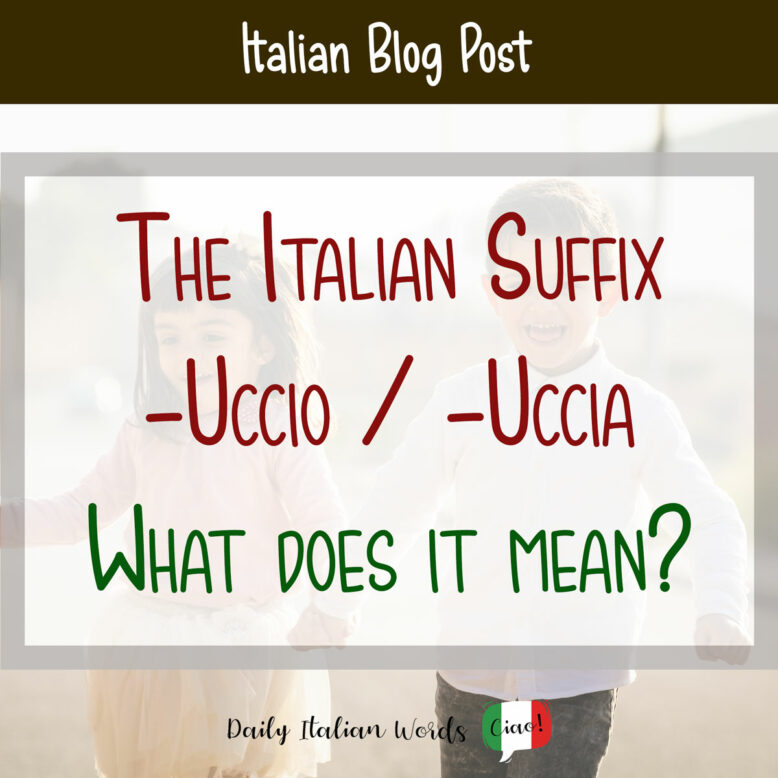In our Facebook group, a common question we come across relates to the suffixes -uccio and -uccia. Many of our readers share that these suffixes were frequently added to their given names, yet their significance remained unknown to them.
But before we delve into the meaning of -uccio and -uccia, it is important to touch upon the topic of modified nouns and modifying suffixes.
-uccio / -uccia

What is a modifying suffix?
A modifying suffix is added to a noun to create a new modified noun with a slightly different meaning, and there are lots of them in Italian! Below are a few of the most common ones you’ll encounter as a learner.
- -ino
- -one
- -etto
- -aglia
- -otto
- -astro
- -accio
- -ello
- -(u)olo
The four different kinds of modified nouns are: diminutives (implying smallness), augmentatives (implying largeness), terms of endearment and pejoratives. For example:
- Diminutive: cioccolato (chocolate) becomes cioccolatino (little chocolate)
- Augmentative: libro (book) becomes librone (big book)
- Term of endearment: orso (bear) becomes orsacchiotto (teddy bear)
- Pejorative: parola (word) becomes parolaccia (swear word)
-uccio and -uccia, which derive from the Latin ucĕu(m), are just two examples of these modifying suffixes, belonging to the category of “diminutives” according to the Italian dictionary Devoto-Oli. However, their purpose is mainly to express affection and foster a sense of familiarity, so they are frequently placed in the “terms of endearment” category as well. (ThoughtCo) The plural forms are -ucci for masculine nouns and -ucce for feminine ones. For those of you who grew up in a Sicilian family, the equivalent is -uzzu.
Here are some common nouns that take -uccio/a:
- caldo (hot / warm) becomes calduccio (warm and snug)
- cavallo (horse) becomes cavalluccio (little horse)
- amore (love) becomes amoruccio (darling / little love)
- becco (beak) becomes beccuccio (spout)

And if you thought these suffixes belonged to just two categories, think again! -uccio and -uccia can also have a negative connotation, as in affare (deal) and affaruccio (worthless deal) or roba (thing) and robuccia (poor quality stuff) (Treccani). Whether the meaning is positive or negative depends greatly on the surrounding context.
-Uccio/a added to personal names
My mother-in-law shared with me that her mother, Maria, was affectionately known as Mariuccia (“little Mary”) by those close to her, and was never called by her given name her entire life. Interestingly, my husband, in his childhood days, would fondly address her as Nonna Uccia, completely omitting the Maria part.
The practice of appending -uccio/a to given names is a common phenomenon throughout Italy. These endearing names exude a sweet and affectionate tone, frequently employed to convey warmth and tenderness. In fact, the prevalence of these pet names is so widespread that some, like the previously mentioned Mariuccia, have evolved into independent names in their own right!
All names can take the -uccio/a suffix but here are a few common examples:
- Mario becomes Mariuccio (“little Mario”)
- Paolo becomes Paoluccio (“little Paolo”)
- Matteo becomes Matteuccio (“little Matteo”)
- Carla becomes Carluccia (“little Carla”)

Heather Broster is a graduate with honours in linguistics from the University of Western Ontario. She is an aspiring polyglot, proficient in English and Italian, as well as Japanese, Welsh, and French to varying degrees of fluency. Originally from Toronto, Heather has resided in various countries, notably Italy for a period of six years. Her primary focus lies in the fields of language acquisition, education, and bilingual instruction.


